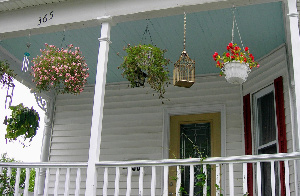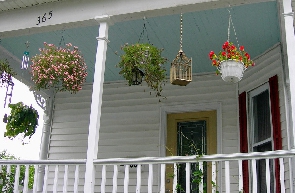Why enslaved Africans continue the culture of painting their buildings in blue in the Caribbean

In South Carolina and Georgia, the color blue holds a significant place in the cultural beliefs of the inhabitants mostly made of descendants of enslaved Africans. It is considered that haint blue has the spiritual ability to protect occupants who whitewash their buildings in such color from evil.
The other school of thought, according to Atlas Obscura, is that the reason the haint blue color is extensively used is in remembrance of the thousands of enslaved Africans who were mistreated on plantations.
In the 18th century when paint was hard to come by, the enslaved relied on indigo dye to adorn their households in the mystical blue color. It is believed the haint blue is able to drive away evil spirits who escaped their physical realms to harm their horses or visit a misfortune on people.
It has become a popular culture among the Gullah Geechee who bought into the beliefs and extensively used the indigo dye on the Lowcountry plantations. The natives were of the view that the color misled the haints to believe they had stepped into water while crossing and would place a distance between them and their victims. Additionally, they resorted to using blue glass bottles which were placed on sticks to drive away marauders.
Despite its popularity, it is not everyone in Gullah Geechee shares in superstitious beliefs. In the early 1930s, the culture was lost on many inhabitants when modernization and migration set in.
Executive Director of the Gullah Geechee Cultural Heritage Corridor National Heritage Area, Heather Hodges, said the dye has a strong connection with slavery because the indigo was produced by the enslaved on the plantations.
Author Andrea Feeser in her book ‘Red, White and Black Make Blue’, said the blue color for many centuries has symbolically stood for protection among West Africans. She explained many amulets which are traced to West Africa often have a blue color associated with the materials used. Largely, the color blue has been associated with some spiritual traditions.
Author Jason Young in his book on rituals of resistance highlighted the importance of haints and boo hags in the traditions and culture of the people. Despite many centuries, many modern houses in Gullah Geechee inherited from slavery have maintained the color texture and the traditions.
Many major paint companies are also cashing in on the tradition to enable people to give their spiritual beliefs a touch of modernity; the belief that the haint blue is steeped in the everyday life of the inhabitants. It has shaped the everyday life of many people in Gullah Geechee because the fear of the havoc that could be visited on someone who fails to paint their house blue has been passed down from generation to generation.
Indigo was initially spotted in South Carolina in 1739. It was one of the biggest exports of the region to other international markets. Its economic value was in the range of more than $30 million annually.
CLICK HERE TO DOWNLOAD PRESS RADIO MOBILE APP
Oral history credits the enslaved Africans for the processing of indigo dye on the plantations.
Source: face2faceafrica.com







